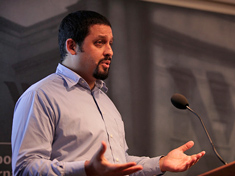-
Wael Hmaidan: Development Goals Unattainable Without Addressing Climate Change
October 3, 2014 By Moses Jackson
When it comes to sustainable development, not all goals are created equal, says Wael Hmaidan, the director of Climate Action Network International, in this week’s podcast. Climate change “intersects everything we do,” he says, but is underrepresented in the Sustainable Development Goals (SDGs), a global development agenda being drafted to replace the Millennium Development Goals next year.
When it comes to sustainable development, not all goals are created equal, says Wael Hmaidan, the director of Climate Action Network International, in this week’s podcast. Climate change “intersects everything we do,” he says, but is underrepresented in the Sustainable Development Goals (SDGs), a global development agenda being drafted to replace the Millennium Development Goals next year.
“There was a deep lack of understanding on the climate change issue and its implication for poverty and development”When the SDG negotiation process began, “there was really no interest in climate change,” he says, “and there was a deep lack of understanding on the climate change issue and its implication for poverty and development in general.”
That is changing, and now goal 13 (of 17) calls for countries to “take urgent action to combat climate change and its impacts.” But this is not enough, says Hmaidan. He argues for rephrasing goal 13, improving the targets for reaching it, and integrating climate change into other goals.
Hmaidan also fears that the climate goal could be dropped, as others wish to reduce the total number of SDGs. This would undermine the credibility of the entire system, he says. “We cannot imagine a sustainable development agenda in this time and age that doesn’t include a climate goal.”
“The Existential Issue”
Climate change is “the existential issue on the table that can affect the survival of human civilization,” says Hmaidan. And while those working on climate change policy may recognize the scope and severity of the problem, the rest of the world doesn’t. “When you go outside of the climate bubble, which is the UNFCCC and such fora, and you come to another forum, this understanding of climate change doesn’t exist.”
“To change everything, we need everyone,” he says, evoking last month’s People’s Climate March, which brought 400,000 activists to New York to urge leaders to take stronger action on climate change ahead of the UN General Assembly.
The importance of having climate change be moved from an environmental problem to become a developmental, and even an existential issue, has to be understood by governments and communities around the world – this is the only way to solve it.
Complementing the UNFCCC
Some question the inclusion of climate in the SDGs out of concern that it will interfere with the UN Framework Convention on Climate Change (UNFCCC) process, which aims to produce a binding international agreement. But the SDGs need not conflict, says Hmaidan, and can actually complement the UNFCCC.
Unlike UNFCCC agreements, the SDGs will not be legally binding, so their effectiveness hinges on their ability to “move feelings.” Language around climate in the SDGs should eschew the “technical” and “diplomatically crafted” style of the UNFCCC, he says, and instead strive to be “inspirational and aspirational,” capturing the spirit of the climate movement. He advocates for a more strongly worded climate goal, such as, “achieve zero net greenhouse gas emissions as soon as possible.”
“To change everything, we need everyone”While the SDGs themselves should be far-reaching and inspiring, Hmaidan suggests getting more specific for the targets that make up each goal. The targets for the climate goal should address issues that aren’t covered in the UNFCCC process, like low-carbon development plans and national legislation, he says, and the targets for the energy goal (“ensure access to affordable, reliable, sustainable, and modern energy for all”) should be more concrete and ambitious to complement the climate goal.
Overall, the targets should be structured to draw out connections between climate change and other development areas, he says. “We cannot look at each goal separately; we need to look at how each of the goals interact with each other.”
The post-2015 sustainable development agenda offers a vital opportunity to build on the gains of the Millennium Development Goals, which did not include climate objectives. But in order for the SDGs to be successful, they must inspire strong, collective action against climate change, says Hmaidan. Without this, “all other goals cannot be achieved.”
Hmaidan spoke at the Wilson Center on September 29.
Friday podcasts are also available for download on iTunes.
 A Publication of the Stimson Center.
A Publication of the Stimson Center.




